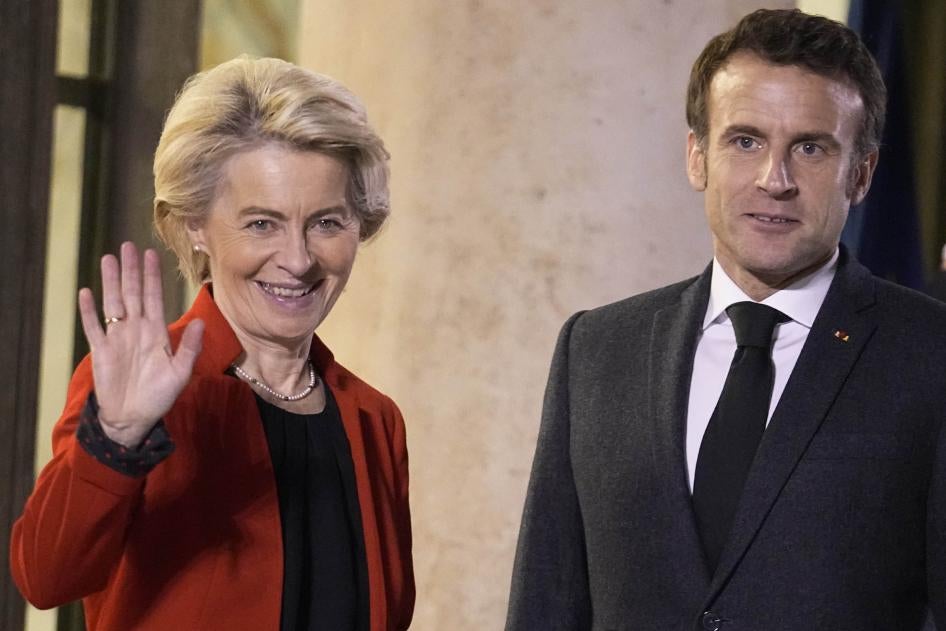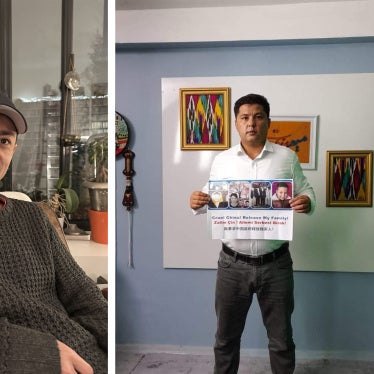(Paris) – French President Emmanuel Macron and European Commission President Ursula von der Leyen should make human rights a priority during their visit to Beijing on April 4-8, 2023, Human Rights Watch said today.
As Chinese President Xi Jinping seeks to reset relations with France and other European governments and the European Union since ending China’s draconian “zero-Covid” policies, Macron and von der Leyen should seize this opportunity to place Europe-China relations in a rights framework.
“President Macron and von der Leyen should not sweep the Chinese government’s deepening authoritarianism under the rug during their visit to Beijing,” said Bénédicte Jeannerod, France director at Human Rights Watch. “They should use their public appearances with Xi Jinping to express strong concerns over widespread rights abuses across China, heightened oppression in Hong Kong and Tibet, and crimes against humanity in Xinjiang.”
Macron and von der Leyen should publicly press for the release of everyone detained and imprisoned on politically motivated grounds. They should include the hundreds of thousands of Uyghurs and other Turkic Muslims in Xinjiang, activists and politicians prosecuted for peaceful political activities in Hong Kong, and protesters arrested for the Covid-19 “white paper” protests on the mainland.
Macron and von der Leyen should also raise individual cases, such as the Uyghur economist and European Parliament’s Sakharov Prize winner Ilham Tohti, and the Hong Kong media tycoon Jimmy Lai. Prior to visiting Beijing, they should meet with civil society groups from mainland China, Xinjiang, Tibet, and Hong Kong.
Macron and von der Leyen’s visit, which appears to be primarily focused on Russia’s invasion of Ukraine, is one of many top-level engagements between Europe and China in recent months. German Chancellor Olaf Scholz and European Council President Charles Michel visited Beijing in November and December respectively. Michel raised the issue of human rights but did not suggest that continued rights violations in China would affect EU-China relations. In February, the Chinese foreign minister, Wang Yi, met with Macron in Paris, and attended the annual Munich Security Conference.
Amid these recent Europe-China engagements, there have been several important human rights developments, Human Rights Watch said. In mid-February, the United Kingdom, French, and EU officials, following public pressure, canceled meetings with a top Xinjiang official sanctioned by the US government, Erkin Tuniyaz.
Around the same time, the EU resumed a “human rights dialogue” with the Chinese government, despite calls to suspend it by civil society organizations. The groups said that the dialogue was clearly ineffectual as the EU had long failed to tie it to tangible progress in China or address the Chinese government’s impunity for grave rights violations. Also in mid-February, Beijing's new ambassador to the EU said that Brussels and Beijing should lift their sanctions on each other so that a bilateral trade agreement can go ahead. The EU had imposed the sanctions on top Xinjiang officials for rights abuses against the Turkic Muslims and Beijing had retaliated.
Since 2019, the EU and some European governments and institutions helped build momentum to hold Beijing accountable for crimes against humanity against the Uyghurs and other Turkic Muslims in Xinjiang with sanctions on Xinjiang's senior officials. In October 2021 at the United Nations, France led an unprecedented cross-regional condemnation of these abuses.
The following year, two months after the Office of the UN High Commissioner for Human Rights issued a groundbreaking report that concluded that the abuses in Xinjiang “may constitute crimes against humanity,” France and other EU member states supported a motion in the UN Human Rights Council to hold a debate on the situation in Xinjiang. While the motion was rejected by a vote of 19 to 17, the narrow margin punctured the Chinese government’s sense of impunity for grave crimes, Human Rights Watch said.
Recent developments suggest that human rights are again at risk of becoming less of a priority, similar to the situation prior to 2019, when many European leaders and governments preferred what they claimed was “quiet diplomacy” in response to China’s growing human rights abuses. This approach generated little pressure on Beijing to reverse the downward spiral of human rights during Xi’s tenure.
During Macron’s last state visit to China, in November 2019, he made no public mention of Beijing’s severe abuses in Xinjiang. At his closing news conference, Macron said he had stressed to Xi the need for dialogue and restraint in Hong Kong. However, he did not call on Xi to respect Hong Kong people’s rights amid the city’s six-month street protests for democracy during which police used excessive force.
The next EU-China leaders’ summit is expected to take place in Brussels in June and the EU’s top diplomat, Josep Borrell, is reportedly planning to visit China soon.
“Russia’s war crimes in Ukraine are no reason for Macron and von der Leyen to ignore the Chinese government’s growing human rights abuses,” Jeannerod said. “Macron and von der Leyen should use their trip to Beijing to speak out on China’s deteriorating rights record and show that France and the EU’s proclaimed commitment to fundamental rights and freedoms also consistently applies to China.”








